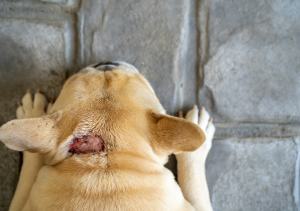If you’re the proud parent of an English Bulldog, you know these wrinkly, lovable companions come with their unique quirks—and sometimes, their unique problems. One common issue that leaves many bulldog owners scratching their heads (and their pups scratching too) is hair loss. English Bulldog hair loss can be concerning, but the good news is, there are ways to solve it. In this blog, we’ll introduce you to everything you need to know about hair loss in English Bulldogs, including causes, treatments, and prevention tips.
Why Is My English Bulldog Losing Hair?
English bulldogs can start loosing their hair for many reasons. While it’s normal to release dead hair during the shedding season, you should definitely be worried by realizing your dog is losing hair in patches. In some cases, a bulldog’s skin can also become black and stay hairless forever. To prevent serious things, we advise you to read this guide carefully.
Common Causes of English Bulldog Hair Loss
Allergies
Bulldogs are notorious for having sensitive skin. Allergies to food, environmental factors like pollen, or even household cleaning products can trigger hair loss. Often, you’ll notice patchy hair loss or hair loss on the sides of your bulldog as they scratch or lick the irritated areas. In case your bulldog starts to scratch or lick his skin, it’s important to react quickly in order to prevent infections. Any cut on the skin can grow into a bigger problem if we don’t heal it when it’s minor.
Dry Skin
Does your English Bulldog have dry, flaky skin along with thinning hair? English Bulldog dry skin and hair loss often go hand-in-hand. Their delicate skin doesn’t hold moisture well, leading to flakiness and irritation that can cause excessive shedding.

Parasites
Parasites like fleas, mites, or ticks are a common culprit behind English Bulldog hair loss spots. These pests can cause intense itching, which leads to scratching and hair loss, especially on areas like the back, neck, and sides.
Skin Infections and Rashes
Bulldogs’ folds and creases can trap moisture, making them a breeding ground for bacteria and yeast. This can lead to skin bumps, rash and hair loss in English Bulldogs, particularly in areas like their wrinkles, armpits, and underbelly.
Hormonal Imbalances
Issues like hypothyroidism or Cushing’s disease can cause hair loss in English Bulldogs. Hormonal imbalances often result in symmetrical hair thinning, usually on the back or sides.
Stress or Anxiety
Stress in dogs can manifest physically, and hair loss is one of the signs. If your bulldog is experiencing changes in their environment, such as moving or a new family member, they might start losing fur as a response. Besides, sudden changes in your daily routine can also be the culprit of your bulldog’s hair loss.
These pooches belong to Molossus dog breeds which means they are bred to work alongside their owners. If an English bulldog spends a lot of time without its owner, it can become stressed about its absence and start showing signs of separation anxiety. Some of the symptoms include rapid heart rate, running through the house and walking in circles, licking paws, and many others.

Where Does English Bulldog Hair Loss Happen?
When it comes to English Bulldog hair loss, the location of the problem can offer clues about the cause.
- Hair loss on the sides: Often linked to allergies or hormonal issues.
- Hair loss spots: These are commonly caused by parasites or localized infections. This requires to be checked with your vet who will probably take a swab from your dog’s skin.
- Hair loss on the back: This could point to dry skin, parasites, or fungal infections. Fungal infection is also followed by a musty, cheese-like or popcorn odor.
- Patchy hair loss: Often associated with mites, allergies, or stress.
- Skin rash with hair loss: Typically a sign of infection, yeast overgrowth, or allergic reactions.

How to Treat English Bulldog Hair Loss
The best English Bulldog hair loss treatment depends on the underlying cause. Here are some common solutions:
Visit the Vet
A vet visit is your first step. They can help identify the root cause of your bulldog’s hair loss—whether it’s allergies, parasites, or a medical condition—and recommend the appropriate treatment.
Address Dry Skin
Hydrating your bulldog’s skin can work wonders. Use a vet-approved moisturizing shampoo and conditioner. Adding omega-3 fatty acids to their diet can also help improve skin hydration.
Treat Parasites
If fleas, ticks, or mites are the issue, your vet may recommend topical treatments, medicated shampoos, or oral medications to eliminate the pests.

Manage Allergies
For allergies, pinpointing the trigger is key. Switching to a hypoallergenic diet or limiting exposure to environmental allergens can reduce symptoms. Your vet may also prescribe antihistamines or other medications.
Medications for Hormonal Issues
If your bulldog has a hormonal imbalance, such as hypothyroidism, they’ll likely need medication to regulate their hormones and restore healthy skin and fur.
Clean Their Skin Folds
Daily cleaning of their wrinkles and skin folds can prevent infections that lead to skin rash and hair loss in English Bulldogs. Use a gentle, vet-approved cleanser to keep bacteria and yeast at bay.
Tips to Prevent Hair Loss in English Bulldogs
While you can’t always stop hair loss before it starts, you can take steps to minimize the risk.
- Feed a Nutrient-Rich Diet: Ensure your bulldog gets a balanced diet with plenty of omega fatty acids for healthy skin and coat. Food rich in antioxidants such as blueberries can also improve the dog’s skin elasticity. You can include them as treats or add them to your dog’s meals.
- Groom Regularly: Brush their coat weekly to remove dead fur and distribute natural oils.
- Bathe Smartly: Use a gentle, dog-specific shampoo, and don’t over-bathe—too much washing can strip natural oils. In case you don’t know which shampoo will suit your dog’s skin best, we recommend you to read the following blog: What is the best English bulldog shampoo?
- Keep Parasites Away: Use flea and tick preventatives year-round to protect your pup from pesky parasites. Natural repellants includes the solution made with water and a few drops of lemongrass oil, lavender oil, and eucalyptus oil. Besides it will protect your dog from insects, ticks, and fleas, but it will also make its coat smell wonderful.
- Reduce Stress: Keep a consistent routine and create a calm environment for your dog to avoid anxiety-related hair loss. If your dog feels anxious, make sure you place his bed in the calmest spot in the house. Choose a semi-opened dog beds instead of opened ones and occupy its attention with interactive dog toys.
- Stay Up-to-Date on Vet Visits: Regular checkups can catch potential skin issues early.

When to See a Vet
If your English Bulldog’s hair loss is severe, accompanied by other symptoms like redness, swelling, or foul odor, or if the treatments you’ve tried aren’t working, it’s time to see your vet. Prolonged hair loss can indicate underlying health problems that need professional attention.
Dealing With English Bulldog Hair Loss: Wrapping Up
Dealing with English Bulldog hair loss can be stressful, but with the right approach, you can help your pup get back to their happy, furry self. Whether it’s a matter of managing dry skin, cleaning up those adorable wrinkles, or tackling pesky parasites, there are plenty of ways to treat and prevent hair loss in your English Bulldog.

